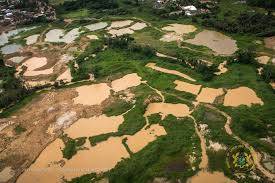From Gold Coast to Gold Cost: A Reflection on Ghana's Journey
Ghana, a country known for its rich history, vibrant culture, and dynamic economy, was once known as the "Gold Coast" during the colonial era. This name, given by the British due to the region's abundant gold resources, encapsulates Ghana’s longstanding relationship with gold, both literally and symbolically. Today, Ghana has transformed from the Gold Coast into a thriving nation with the modern moniker of the "Gold Cost," a term that reflects not only the country’s ongoing wealth in natural resources but also its evolving economic aspirations and progress.
The Legacy of the Gold Coast
The name "Gold Coast" dates back to the early 15th century when European traders, particularly the Portuguese, arrived on the shores of what is now Ghana. The region was rich in gold, making it an attractive destination for European explorers and later colonial powers. As trade in gold and other resources flourished, the British, Dutch, and other European powers established forts and trading posts along the coast, solidifying their presence in the area.
In 1874, the British officially made the Gold Coast a colony, and it remained under British rule until it gained independence in 1957. The country’s natural resources, especially gold, continued to play a central role in its economy throughout this period, helping to shape the nation's identity and provide an economic foundation for the future.
The Rise of Ghana: From Gold Coast to Modern-Day Power
Ghana’s journey from the Gold Coast to a sovereign nation is one marked by struggle, resilience, and hope. Under the leadership of Kwame Nkrumah, the first Prime Minister and President of Ghana, the country became the first in sub-Saharan Africa to gain independence from colonial rule. In 1957, the Gold Coast officially became Ghana, named after the ancient West African empire that once thrived in the region. This moment was not only a pivotal point in Ghana’s history but also an inspiring symbol of African self-determination and freedom.
Since independence, Ghana has worked to harness its natural resources, including gold, cocoa, and timber, to build its economy. The country has seen significant development in infrastructure, education, and health care, although challenges like political instability, poverty, and foreign debt have also played a part in shaping its economic trajectory. Nonetheless, Ghana’s gold resources have remained a critical element of its national wealth.
Ghana’s Economic Transformation: The Gold Cost
In recent years, Ghana has undergone a transformation, evolving from its colonial identity as the Gold Coast to the modern "Gold Cost." This term reflects the nation’s efforts to become a leading player in the global economy, capitalizing on its vast resources while diversifying its economic base. The country is now one of the largest gold producers in the world, with gold mining contributing significantly to its GDP and export revenues.
However, Ghana’s vision for its economy goes beyond just gold. The government has focused on creating a diversified economy with emphasis on agriculture, manufacturing, and services. The nation has made strides in increasing industrialization, fostering entrepreneurship, and developing its tourism sector. Ghana’s commitment to improving infrastructure, education, and healthcare also positions the country as a rising star in West Africa.
Moreover, Ghana has made remarkable progress in its political stability and governance. With peaceful transitions of power through democratic elections, Ghana is often seen as a model of democracy in Africa. The country has also embraced international partnerships, engaging in trade agreements and investment opportunities that position it as an attractive destination for foreign investment.
Conclusion
Ghana’s journey from the Gold Coast to the Gold Cost is more than a geographical or historical shift; it is a testament to the country’s resilience and vision for the future. The legacy of gold remains central to the nation’s identity, but today, it symbolizes not just mineral wealth, but the country’s ambitions to forge a prosperous and diversified economy. As Ghana continues to build on its rich resources, it aims to shine as a beacon of progress in Africa, demonstrating that the true value of the "Gold Cost" lies not just in the gold beneath the earth, but in the potential of its people and their aspirations for a brighter future.



